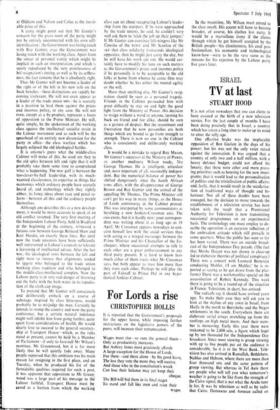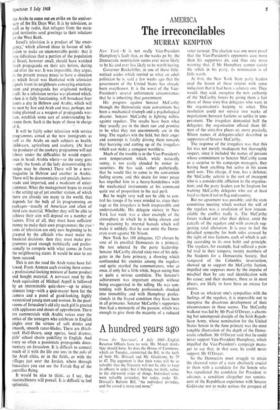TV at last
ISRAEL STUART HOOD
It is not often nowadays that one can claim to have assisted at the birth of a new television service. For the last couple of months I have been doing precisely that in Israel, a country which has taken a long time to make-up its mind to enter the telly age.
One effective brake was the implacable opposition of Ben Gurion in the days of his power; but his was not the only voice raised against the innovation. It was argued that a country of only two and a half million, with a heavy defence budget, could not afford the luxury; that there were other and more press- ing priorities such as housing for the new immi- grants; that it would lead to the personalisation of politics and the trivialisation of public affairs; and, lastly, that it would result in the secularisa- tion of traditional ways of thought and be- haviour. Not all of these doubts have been assuaged, but the decision to move towards the establishment of a television service has been taken with the result that a Provisional Authority for Television is now transmitting occasional programmes on an experimental basis. The terminology one must employ to de- scribe the operation is an accurate reflection of the ambivalent attitude which still prevails in some quarters. What the public has seen so far has been varied. There was an outside broad- cast of the Independence Day parade. (The fact that Moshe Dayan was not shown in close-up led to elaborate theories of political conspiracy.) There was a concert with Leonard Bernstein conducting Mahler. ('I am Mahler,' he is re- ported as saying as he got down from the plat- form.) There was a workmanlike special on the assassination of Robert Kennedy. This week there is going to be a round-up of the situation in France. Television, in short, has arrived.
The radicals say it should have arrived years ago. To make their case they will ask you to look at the skyline of any town in Israel, from Haifa in the north to Beersheba and the Negev settlements in the south. Everywhere there are elaborate aerial arrays stretching up from the rooftops on high metal masts. And their num- ber is increasing. Early this year there were reckoned to be 2,800 sets, a figure which leapt up by ten thousand for the Independence Day broadcast. Since most viewing is group viewing with up to five people per set the audience is considerable. So it is in the West Bank. Tele- vision has also arrived in Ramallah, Bethlehem, Nablus and Hebron, where there are more than four thousand sets and the same pattern of group viewing. But whereas in Tel Aviv there are people who will tell you what tomorrow's weather is going to be like from the strength of the Cairo signal, that is not what the Arabs tune m for. It was by television as well as by radio that Cairo. Damascus and Amman called on
the Arabs to come out on strike on the anniver- sary of the Six Days War. It is by television, as well as by radid, that refugees from the occu- pied territories send greetings to their relations on the West Bank.
Israel's television is a product of 'the emer- gency,' which allowed those in favour of tele- vision to make an unanswerable point: that it was ridiculous that a portion of the population of Israel, however small, should have watched Arab propaganda on their sets before, during after the war. It was impossible, they argue, in the present uneasy peace to have a situation in which Israel was blanketed with television signals from its neighbours conveying entertain- ment and propaganda but originated nothing hself. So a television service was planned which, when it is fully functioning, will broadcast four hours a day in Hebrew and Arabic, which will be seen by Jew and Arab and may, perhaps, not being planned as a weapon of propaganda war- fare, establish some sort of understanding be- tween them. Such is the hope of those in charge of it.
It will be fairly sober television with service programmes aimed at the new immigrants as well as the Arabs on such subjects as health, child-care, agriculture and cookery. (At least the producer of the cookery programme will not labour under the difficulties he would experi- ence in Saudi Arabia where—so the story goes —only the hands of the lady demonstrating the recipe may be shown.) There will be a news magazine in Hebrew and another in Arabic. There will be documentaries and specials, home- made and imported, and a modicum of enter- tainment. What the management hopes to avoid is the setting up of yet another station, of which there are already too many in the world, that depends for the bulk of its programming on packages—usually of American and often of third rate material. Whether they will be able to achieve their aim will depend on a number of factors. First of all, they must have sufficient money to make their own programmes; the true • costs of television are only now beginning to be grasped by the officials who must make the financial decisions. then they must make pro- grammes good enough technically and profes- sionally to compete with what comes in from the neighbouring states. It would be nice to see them succeed.
This is not the road the Arab states have fol- lowed. From Amman each evening there comes a professional-looking mixture of home product and bought material. A newscast read by the Arab equivalent of Michael Aspell is followed by an interminable quiz-show—up to ninety minutes long—with a quiz-master born for the camera and a panel of good-looking, highly westernised young men and women. In the pool- rooms of Jerusalem's old city each girl is greeted with applauses and shouts of approbation. There are commercials with Arabic voices over the antics of the teenagers who celebrate in English jingles over the virtues of soft drinks and smooth, smooth razor-blades. There are Hitch- cock Half-Hours, soap operas, local dramas, girls' school choirs yodelling in English. And every so often a passionate propaganda docu- mentary on Jerusalem. It is difficult to connect much of it with the life one sees in the suks of the Arab cities, or in the fields, or with the villages just over the Jordan, where through binoculars you can see the Fattah flag of the guerrillas flying.
It would be nice to think, as I say, that reasonableness will prevail. It is difficult to feel optimistic.











































 Previous page
Previous page